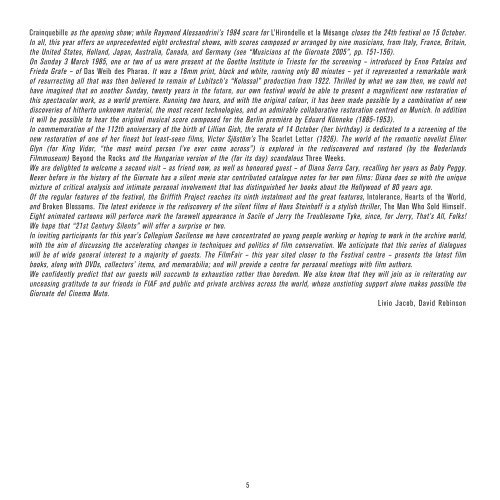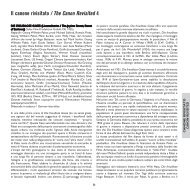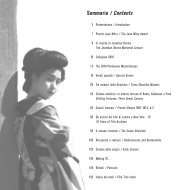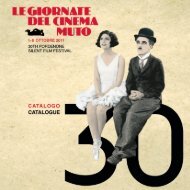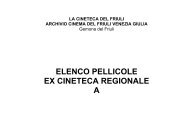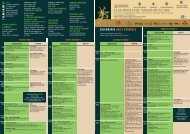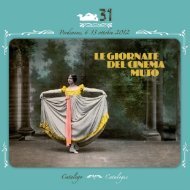Le Giornate del Cinema Muto 2005 Sommario / Contents
Le Giornate del Cinema Muto 2005 Sommario / Contents
Le Giornate del Cinema Muto 2005 Sommario / Contents
Create successful ePaper yourself
Turn your PDF publications into a flip-book with our unique Google optimized e-Paper software.
Crainquebille as the opening show; while Raymond Alessandrini’s 1984 score for L’Hiron<strong>del</strong>le et la Mésange closes the 24th festival on 15 October.<br />
In all, this year offers an unprecedented eight orchestral shows, with scores composed or arranged by nine musicians, from Italy, France, Britain,<br />
the United States, Holland, Japan, Australia, Canada, and Germany (see “Musicians at the <strong>Giornate</strong> <strong>2005</strong>”, pp. 151-156).<br />
On Sunday 3 March 1985, one or two of us were present at the Goethe Institute in Trieste for the screening – introduced by Enno Patalas and<br />
Frieda Grafe – of Das Weib des Pharao. It was a 16mm print, black and white, running only 80 minutes – yet it represented a remarkable work<br />
of resurrecting all that was then believed to remain of Lubitsch’s “Kolossal” production from 1922. Thrilled by what we saw then, we could not<br />
have imagined that on another Sunday, twenty years in the future, our own festival would be able to present a magnificent new restoration of<br />
this spectacular work, as a world premiere. Running two hours, and with the original colour, it has been made possible by a combination of new<br />
discoveries of hitherto unknown material, the most recent technologies, and an admirable collaborative restoration centred on Munich. In addition<br />
it will be possible to hear the original musical score composed for the Berlin première by Eduard Künneke (1885-1953).<br />
In commemoration of the 112th anniversary of the birth of Lillian Gish, the serata of 14 October (her birthday) is dedicated to a screening of the<br />
new restoration of one of her finest but least-seen films, Victor Sjöstöm’s The Scarlet <strong>Le</strong>tter (1926). The world of the romantic novelist Elinor<br />
Glyn (for King Vidor, “the most weird person I’ve ever come across”) is explored in the rediscovered and restored (by the Nederlands<br />
Filmmuseum) Beyond the Rocks and the Hungarian version of the (for its day) scandalous Three Weeks.<br />
We are <strong>del</strong>ighted to welcome a second visit – as friend now, as well as honoured guest – of Diana Serra Cary, recalling her years as Baby Peggy.<br />
Never before in the history of the <strong>Giornate</strong> has a silent movie star contributed catalogue notes for her own films: Diana does so with the unique<br />
mixture of critical analysis and intimate personal involvement that has distinguished her books about the Hollywood of 80 years ago.<br />
Of the regular features of the festival, the Griffith Project reaches its ninth instalment and the great features, Intolerance, Hearts of the World,<br />
and Broken Blossoms. The latest evidence in the rediscovery of the silent films of Hans Steinhoff is a stylish thriller, The Man Who Sold Himself.<br />
Eight animated cartoons will perforce mark the farewell appearance in Sacile of Jerry the Troublesome Tyke, since, for Jerry, That’s All, Folks!<br />
We hope that “21st Century Silents” will offer a surprise or two.<br />
In inviting participants for this year’s Collegium Sacilense we have concentrated on young people working or hoping to work in the archive world,<br />
with the aim of discussing the accelerating changes in techniques and politics of film conservation. We anticipate that this series of dialogues<br />
will be of wide general interest to a majority of guests. The FilmFair – this year sited closer to the Festival centre – presents the latest film<br />
books, along with DVDs, collectors’ items, and memorabilia; and will provide a centre for personal meetings with film authors.<br />
We confidently predict that our guests will succumb to exhaustion rather than boredom. We also know that they will join us in reiterating our<br />
unceasing gratitude to our friends in FIAF and public and private archives across the world, whose unstinting support alone makes possible the<br />
<strong>Giornate</strong> <strong>del</strong> <strong>Cinema</strong> <strong>Muto</strong>.<br />
Livio Jacob, David Robinson<br />
5


